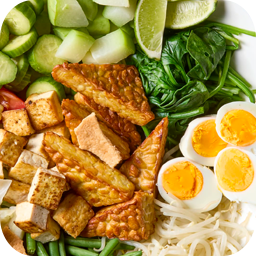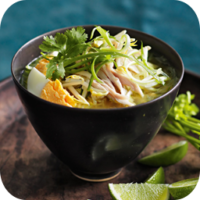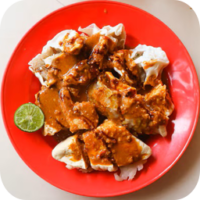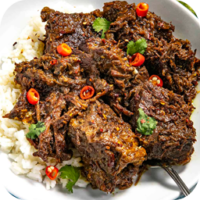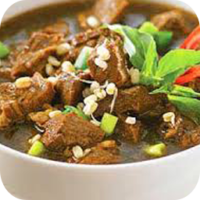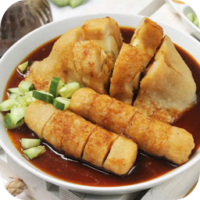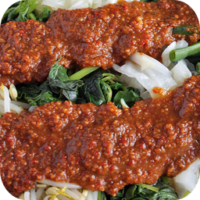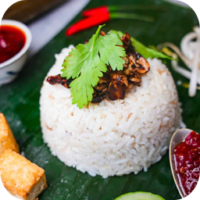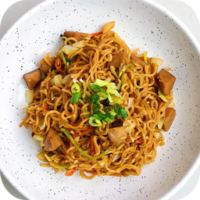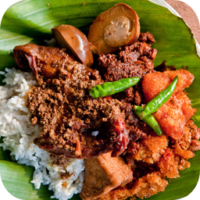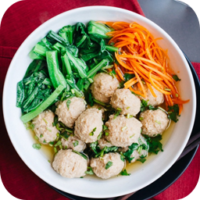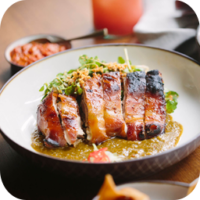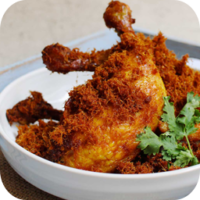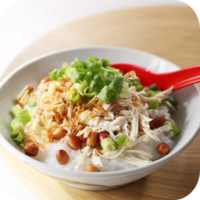Posted by theeatland
- Dec 26, 2024
- 83
- 0
Gado-Gado is a traditional Indonesian dish that is often referred to as an Indonesian salad. It consists of a variety of boiled or steamed vegetables, sometimes with rice or boiled potatoes, and is topped with a rich, flavorful peanut sauce. The dish is typically served with additional toppings such as hard-boiled eggs, tofu, tempeh, and crackers. Gado-Gado is widely loved for its refreshing, healthy, and satisfying nature, combining different textures and flavors in one dish.
Key Features of Gado-Gado:
- Main Ingredients:
- Vegetables: The base of Gado-Gado is made up of a mix of boiled or steamed vegetables, including green beans, spinach, cabbage, sprouts, and carrots. Potatoes are often added as well.
- Tofu and Tempeh: These plant-based proteins are commonly added, providing both texture and nutrition.
- Hard-Boiled Eggs: Hard-boiled eggs are typically included to add richness and protein.
- Peanut Sauce: The key element of Gado-Gado is its rich, creamy, and slightly spicy peanut sauce, made from ground peanuts, coconut milk, tamarind, lime, chili, and various spices.
- Rice or Rice Cakes: Often served with a side of steamed rice or lontong (rice cakes) to complete the dish.
- Krupuk (Crackers): For added crunch and flavor, Gado-Gado is frequently served with krupuk, which are crispy crackers, typically made from shrimp or rice flour.
- Dressing/Peanut Sauce:
- The peanut sauce is a key component of Gado-Gado. It’s made by blending roasted peanuts with spices, chili, garlic, sweet soy sauce (kecap manis), lime juice, and sometimes coconut milk, creating a savory, creamy dressing that is drizzled over the vegetables and proteins.
- Serving Style:
- Gado-Gado is often served as a main dish or a side dish in Indonesian cuisine, especially in larger meals or as a street food snack.
- It is typically served as a mixed salad, where all the ingredients are placed on a plate and then topped with the peanut sauce. The dish is meant to be eaten with a spoon or fork, mixing the components together.
- Regional Variations:
- Gado-Gado Betawi: A variation from Jakarta, which may include more regional spices and slightly different types of vegetables.
- Gado-Gado Surabaya: Another regional variation that may add more fried tempeh or tofu.
Cultural Significance:
- Gado-Gado is a comfort food in Indonesia and is often eaten for lunch or dinner. It is commonly found at street food stalls, food markets, and in traditional Indonesian restaurants.
- The dish reflects Indonesia’s culinary diversity, combining vegetables, proteins, and a rich, flavorful sauce to create a balanced and delicious meal.
- Gado-Gado is also seen as a healthy dish, rich in vegetables, protein, and healthy fats, making it a great option for vegetarians and vegans.
Fun Fact:
In Indonesia, the name “Gado-Gado” literally translates to “mix-mix,” which reflects how the ingredients are mixed together with the peanut sauce, creating a harmonious blend of textures and flavors.
Summary:
Gado-Gado is a vibrant Indonesian salad made with boiled or steamed vegetables, tofu, tempeh, hard-boiled eggs, and topped with a rich peanut sauce. Often served with rice or rice cakes and crispy crackers, Gado-Gado is a refreshing, healthy dish that is both satisfying and delicious, widely enjoyed across Indonesia.
Tags:
- boiled vegetables
- Gado-Gado
- Gado-Gado recipe
- hard-boiled eggs
- healthy Indonesian dish
- Indonesian appetizer
- Indonesian comfort food
- Indonesian cuisine
- Indonesian food
- Indonesian salad
- lontong
- peanut dressing
- peanut sauce
- rice cakes
- Southeast Asian food
- street food
- tempeh
- tofu
- traditional dish
- vegetable salad
- vegetarian food
Recommended Posts
- Dec 26, 2024
- 72 read
Indonesian Soto is a traditional soup dish that is highly popular across...
Read Article- Dec 26, 2024
- 105 read
Indonesian Siomay is a popular street food dish influenced by Chinese dumplings...
Read Article- Dec 26, 2024
- 102 read
Indonesian Sate (or Satay) is a widely popular dish consisting of skewered...
Read Article- Dec 26, 2024
- 112 read
Rendang is a highly popular and iconic dish from Indonesia, originating from...
Read Article- Dec 26, 2024
- 85 read
Rawon is a traditional Indonesian beef soup originating from East Java. It...
Read Article- Dec 26, 2024
- 107 read
Pempek is a traditional Indonesian dish originating from Palembang, South Sumatra. It...
Read Article- Dec 26, 2024
- 80 read
Pecel is a traditional Indonesian dish that is commonly found in Java....
Read Article- Dec 26, 2024
- 94 read
Nasi Uduk is a traditional Indonesian dish that features fragrant, coconut rice...
Read Article- Dec 26, 2024
- 124 read
Nasi Padang is a traditional Indonesian dish from Padang, the capital of...
Read Article- Dec 26, 2024
- 70 read
Nasi Goreng is a beloved and iconic Indonesian dish that translates to...
Read Article- Dec 26, 2024
- 75 read
Mie Goreng is a popular Indonesian dish that translates to "fried noodles."...
Read Article- Dec 26, 2024
- 100 read
Martabak is a popular Indonesian street food, known for its delicious, savory...
Read Article- Dec 26, 2024
- 72 read
Lumpia is a popular Indonesian snack or appetizer that consists of a...
Read Article- Dec 26, 2024
- 91 read
Indonesian Gudeg is a traditional dish from Yogyakarta and Central Java, made...
Read Article- Dec 26, 2024
- 128 read
Indonesian Bakso is a popular meatball soup dish that is a favorite...
Read Article- Dec 26, 2024
- 81 read
Indonesian Babi Guling is a traditional roast pig dish from Bali, Indonesia....
Read Article- Dec 26, 2024
- 75 read
Indonesian Ayam Goreng translates to "Fried Chicken", but it is much more...
Read Article- Dec 26, 2024
- 72 read
Indonesian Tempeh is a traditional soy product originating from Indonesia, made through...
Read Article- Dec 26, 2024
- 107 read
Bubur Ayam is a popular Indonesian dish that consists of savory rice...
Read Article
